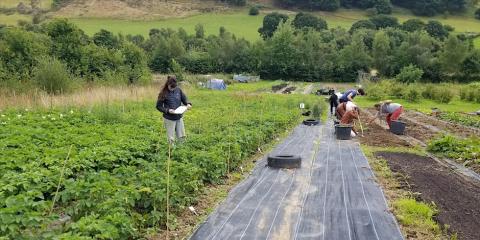Date and time
Wed, 15 Nov 2023 19:30 - 20:30 GMT
Register HERE
Perennial green manures are fertilisers made from the nitrogen-rich leaves of trees, shrubs and perennial plants. It’s an experimental technique presently being trialled on a small scale by a group of growers in mid-Wales.
Much like the fertility-building clovers and vetches long-used by farmers, nitrogen fixing trees and shrubs such as alder and gorse work with bacteria in the soil to convert nitrogen into a form useful to plants. They can be grown in biodiverse areas of coppice woodland and perennial plantings. These fertiliser-producing areas can be situated on less productive areas of farms such as steep slopes or boggy ground. They will also serve as biodiversity reserves and build up carbon stores in roots and soil.
Adequate nitrogen is key to good yields but supplying the right amount at the right time is tricky. When it’s in a form available to plants, it’s also easily lost from the soil, which can contribute to greenhouse gas emissions and water pollution. To manage organic nitrogen more efficiently, growers can use ‘mobile’ green manures, by harvesting nitrogen-rich leaf matter from elsewhere and applying it to cropland in a targeted manner.
This online session is part webinar and part workshop. We’d like to hear from anyone already using, or interested in trialing perennial green manures and we’ll discuss the potential challenges and successes. Are there any specific areas of interest you’d like to trial within this practice? It is hoped that the webinar may lead to a new Innovative Farmers field lab.
Agenda
7.30 – Intro and welcome
7.40 – Perennial Green Manures – Clo Ward
7.55 – A grower’s experience
8.10 – Discussion and Q&A
8.30 – End
Speakers
Clo Ward: Clo (Chloe) Ward is currently the researcher for the Perennial Green Manures project, run by Ecodyfi. See https://www.dyfibiosphere.wales/perennial-green-manures for more on the project.
Please be aware: we will be recording this event and it will be available for public view. If you are not comfortable with this we recommend you turn your camera off for the duration of the webinar.
Photo credit: Ben Raskin



